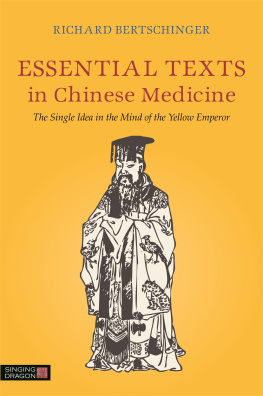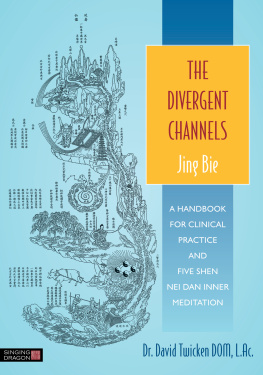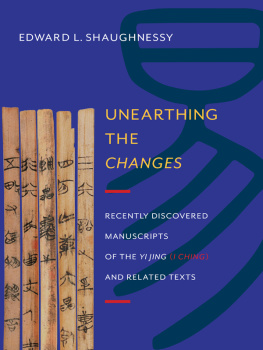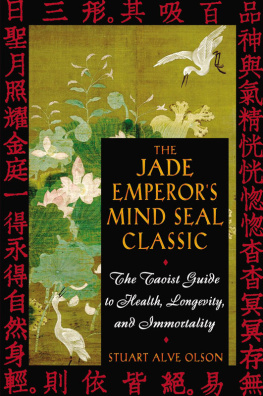Contents
Guide
The Book of the Hidden Agreement
Yinfu jing
A Taoist Text on the Harmony between Heaven and Humanity
Attributed to the Yellow Emperor (Huangdi )
Commentary by Yu Yan (12581314)
Translated from the original Chinese
by Fabrizio Pregadio
Golden Elixir Press
This ebook is excerpted from:
Taoist Internal Alchemy: An Anthology of Neidan Texts
by Fabrizio Pregadio (Golden Elixir Press, 2019)
Golden Elixir Press
Mountain View, CA
www.goldenelixir.com
2019 Fabrizio Pregadio
All rights reserved
Cover : The Yellow Emperor (Huangdi).
INTRODUCTION
Despite its brevity, the Yinfu jing , or Book of the Hidden Agreement , is one of the most obscure and difficult Taoist texts. Traditionally attributed to the Yellow Emperor (Huangdi, one of mythical founders of Chinese civilization, and the foremost in the eyes of the Taoists), it dates from between the late sixth and the eighth century. It exists in two main versions, containing slightly more than 300 and slightly more than 400 characters, respectively.
Later texts of Neidan (Internal Alchemy) have often placed the Yinfu jing with the Daode jing (Book of the Way and Its Virtue) and the Cantong qi (The Seal of the Unity of the Three) at the origins of their teachings. Within Neidan, the text is especially well-known for its idea of stealing the mechanism (daoji ), which Neidan adepts understand as meaning the inversion of the process that leads from the precelestial to the postcelestial domains.
Several dozen commentaries to the Yinfu jing are found both within and outside the Taoist Canon. The commentary translated here is by Yu Yan (born in Suzhou, 12581314), a learned and prolific author of independent works and commentaries to earlier texts. Part of his works examine the Book of Changes (Yijing ) and Chinese cosmology, while others are concerned with Neidan (including a major commentary to the Cantong qi ). While Yu Yan is one of the authors who incorporate key concepts of Neo-Confucianism in their Neidan, his writings display a remarkable knowledge of both Nanzong (Southern Lineage) and Beizong (Northern Lineage) literature.
This ebook contains a complete translation of the Yinfu jing with Yu Yans commentary. As he explains at the end of his work, Yu Yan uses the shorter version of the Yinfu jing . Divisions into sections follow the original Chinese text; I have added section numbers.
SECTION 1
Contemplate the Way of Heaven, hold to the operation of Heaven: this is completeness.
COMMENTARY
Being of itself as it is is the Way of Heaven; revolving to the left and turning to the right, without interruption day and night, is the operation of Heaven.
The Zhongyong (The Middle Course) says: Sincerity is the Way of Heaven.
This is completeness means that although the words contemplate the Way of Heaven, hold to the operation of Heaven are concise, their meaning is complete. There is nothing to add.
SECTION 2
Heaven has five bandits; the one who sees them flourishes. The five bandits are in the Heart; they perform their operation in Heaven.
COMMENTARY
The five bandits are the five agents. Zhu Ziyang (Zhu Xi) said:
What is good in the world is born from those five, and what is bad is also due to those five. Therefore [the Yinfu jing ] uses words to the contrary and calls them the five bandits.
The five agents of Heaven are Water, Fire, Wood, Metal, and Soil; and the five agents of Man are sight, hearing, speech, behavior, and thinking. The five agents of Heaven are in Heaven and can be seen. The five agents of Man are in the Heart; how can they be seen? If one can see not only what is easy to see, but also what is difficult to see, then there is nothing that one cannot see. Therefore it says, The one who sees them flourishes.
Why does it say that they are in the Heart? This means that sight is concerned with seeing clearly; hearing is concerned with hearing sharply; speech is concerned with being loyal; and behavior is concerned with being respectful; but concern is the function of the Heart.
Why does it say that they perform their operation in Heaven? This refers to wind, rain, sunshine, cold, and warmth.
SECTION 3
The cosmos is in ones own hands, the ten thousand transformations are born from oneself.
COMMENTARY
If one is able to set that mechanism in motion and to seize the mechanism of Heaven and Earth, then the creation and transformation of Heaven and Earth are in oneself. Therefore it says, The cosmos is in ones own hands, the ten thousand transformations are born from oneself.
Shao Kangjie (Shao Yong) says in his Guanyi yin (Chant on Contemplating Change):
Each thing since its beginning has a body,
and each body has a Qian and a Kun of its own.
For one who knows that the ten thousand things are complete in oneself,
how could the Three Powers have a separate root?
Heaven from the One Center makes creation and transformation;
Man from his Heart weaves the warp and the weft.
Could Heaven and Man have two different minds?
But keeping away from following vain courses lies only with Man .
This is what [the Yinfu jing ] means.
SECTION 4
The Nature of Heaven is Man; the Heart of Man is the mechanism.
COMMENTARY
Quiescence in the life of Man is the Nature of Heaven. Therefore it says, the Nature of Heaven is Man. The mechanism moving in the Center is the Heart of Man. Therefore it says, the Heart of Man is the mechanism.
SECTION 5
Establish the Way of Heaven, and thereby stabilize Man.
COMMENTARY
When Man is able to establish his sincerity and is not moved by human desires, then Heaven is stabilized and Man is also stabilized. Therefore it says, establish the Way of Heaven, and thereby stabilize Man.
SECTION 6
Heaven releases the mechanism of taking life, and dragons and snakes arise from the ground. The Earth releases the mechanism of taking life, and stars and constellations fall and disappear . Man releases the mechanism of taking life, and Heaven and Earth are overturned.
COMMENTARY
When Heaven above releases the mechanism of taking life, dragons and snakes respond to it, and they arise from the ground. When the Earth below releases the mechanism of taking life, stars and constellations respond to it, and they fall and disappear. When Man in the middle releases the mechanism of taking life, what is above and what is below respond to it, and Heaven and Earth are overturned.
Those who are skilled in strategy (quanmou ) and tactics (zhishu ) know this principle, and therefore they make the example of the snake of Mount Heng: if you hit it in the head, its tail responds; if you hit it in the tail, its head responds; and if you hit it in the middle, both its head and tail respond.
Those who cultivate themselves know this principle, and therefore take the head as Heaven, the belly as the Earth, and the Heart as Man. Their method consists in concealing the spirit within. They guide the coming and going of inhalation and exhalation, so that it reaches the Muddy Pellet (niwan ) above and the Gate of Life (mingmen ) below; Their rise and fall and their coming and going are inexhaustible and endless. This is Heaven and Earth being overturned within oneself.
The discourses of these two groups have their own motives, but their principles are obscurely joined. In fact, those who have humanity (





